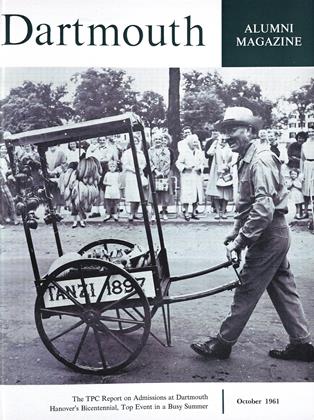By ShermanAdams '20. New York: Harper, 1961.481 pp. $5.95.
Anyone interested in a carefully written, easily read account of six vital years of our nation's history will find Firsthand Report by Sherman Adams '20 an enjoyable and enlightening book. Anyone expecting startling revelations regarding the Adams-Goldfine relationship or sensational new information as to events or personalities connected with the administration of Dwight D. Eisenhower '53h will be disappointed.
Writing with the same succinct objectivity that characterized his state papers while Governor of New Hampshire, Adams begins his Report with Eisenhower's invitation for him to serve as The Assistant to the President, made shortly after the 1952 election. He ends with his resignation in September 1958. Except for brief flashbacks to the spirited campaign in New Hampshire and his service as Eisenhower's floor manager at the Chicago Convention, and a sort of philosophical postscript based on conversations with the President as his term drew to a close, the Report proceeds in a generally chronological order. There are highlights of recurring political crises, both foreign and domestic, as well as the personal crises resulting from the President's several illnesses.
Governor Adams describes the crises at Suez and in Lebanon and confirms the close working relationship between Eisenhower and Dulles. He recalls the continuous struggle for a balanced budget and the President's dogged support of the farm policies of Ezra Taft Benson. New light is shed on the Eisenhower-Nixon relationship, both at the time of the President's first illness and the abortive "ditch-Nixon" episode prior to the 1956 Convention. '
As the chief architect and operator of the most highly developed staff system ever existent in American government, Adams naturally defends the system, more through describing its daily operations than in debating its fundamental concept. By inference the staff system stands out in sharp contrast to the "do-it-yourself" technique of other administrations. Sympathy for any President is increased when one reads Eisenhower's exasperated statement, "When does anybody get any time to think around here?" There is no intimation, however, that the staff system prevented the President from being master of every important situation.
The book contains almost no personal criticism of individuals. Except for Defense Secretary Wilson's being too free to speak up too frequently on any subject before the Cabinet, and Senator Knowland's being too stubbornly in opposition to many of the Eisenhower programs (which was not so frequently reflected in his voting record), there seems to have been sweetness and light in the Eisenhower official family. There is, however, some implied criticism of the Boss himself by an aide who was a graduate of the school of partisan political warfare. Governor Adams has this to say:
Eisenhower "rarely carried an argument to the point of really getting tough and using a reprisal to bring the dissidents into line... .
"It was Eisenhower's reluctance to enforce internal discipline among the Republicans, his refusal to stoop to the ward-boss, strong-arm tactics that were Harry Truman's stock in trade, that made his political leadership appear by comparison hesitant and ineffectual."
This is not to imply that Adams does not still like Ike. In fact, the theme of FirsthandReport is that Dwight Eisenhower was one of our greatest presidents; a man dedicated to peace, willing to delegate responsibility, unafraid to make -final decisions himself, and so disciplined to serve his country that he ably performed the hardest job in the world for eight years, in spite of serious illnesses and the countless frustrations which are inherent in high public office.
 View Full Issue
View Full Issue
More From This Issue
-
 Feature
Feature... AND MANY DARTMOUTH YESTERDAYS
October 1961 By Edward Connery Lathem '51 -
 Feature
FeatureWHY a Hopkins Center at Dartmouth?
October 1961 -
 Feature
FeatureWHAT OF ADMISSIONS AT DARTMOUTH?
October 1961 -
 Feature
FeatureADMISSIONS – As Seen at the President's Desk
October 1961 By J.S.D. -
 Feature
FeatureIt Was Summer, Yes, But Quiet... NO
October 1961 -
 Article
ArticleTHE FACULTY
October 1961 By GEORGE O'CONNELL
Books
-
 Books
BooksLittle Theater Organization and Management
MAY 1927 -
 Books
BooksFaculty Articles
December 1945 -
 Books
BooksSUB ROSA: THE OSS AND AMERICAN ESPIONAGE
May 1946 By Arthur M. Wilson. -
 Books
BooksCARTAS SOBRE EL ANFITEATRO TARRACONENSE.
JUNE 1972 By JOHN HURD '21 -
 Books
BooksTHEY ALL PLAYED RAGTIME
March 1951 By JOHN L. STEWART -
 Books
BooksINVESTMENT, PRINCIPLES AND ANALYSIS
June 1938 By John W. Harriman.

